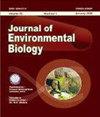Effect of application of lime with vermicompost on the activities of microorganisms of some acidic soils of West Bengal
IF 0.7
Q4 ENVIRONMENTAL SCIENCES
引用次数: 0
Abstract
Aim: To evaluate the efficacy of integrated application of lime at partial doses of lime requirement (LR) with vermicompost in acid soils to minimize the soil acidity, improve the population of beneficial microorganisms and their microbial activities in comparison to sole treatment of lime as per Lime Requirement dose. Methodology: Two highly acidic soils collected from the farmer’s field of South 24 Parganas district, West Bengal having no history of acidity management were used. The soils were treated with different rates of lime requirement (LR, ⅔LR & ½LR) and lime (½LR) + vermicompost (5 tha-1) treatments and incubated for 60 days. Soil pH, soil organic carbon content, different microbial populations, microbial respiration and enzymatic activities (FDHA and DHA) were assessed at different days. Results: The study indicated that the lime treatments showed rapid increase in soil pH towards the slightly alkaline condition whereas lime +vermicompost treatment (T5) successfully maintained the neutralized condition. Integrated treatment of lower doses of lime and vermicompost (T5) was found to efficiently promote the microbial population (rhizobium, phosphate and potassium solubilizing bacteria) and microbial respiration (basal and substrate induced respiration) activity, which might be attributed to the improvement soil microbial status. FDHA and DHA increased significantly with ‘lime’ as well as the ‘lime with vermicompost’ treatments in comparison to control. Interpretation: The incorporation of lower amount of lime and organic matter efficiently neutralizes the acidity and boosted up the microbial activities simultaneously that in turn might improve the soil health. The high cost to purchase the huge quantity of lime as recommended LR (9.25 tha-1) for studied soils turns the farmers uninterested to follow lime practice and interrupted the mitigation of soil acidity. Thus, the study might conclude that the integrated approach of lime application@½LR with vermicompost might successfully ameliorate the acid soils in terms of acidity as well as the soil microbial activities. Key words: Acid soil, BSR, Dehydrogenase, Fluorescein diacetate, SIR, Lime, Vermicompost石灰配蚯蚓堆肥对西孟加拉邦部分酸性土壤微生物活性的影响
目的:评价在酸性土壤中,与按需要量单独施用石灰相比,按部分需要量施用石灰与蚯蚓堆肥在降低土壤酸度、提高有益微生物数量和微生物活性方面的效果。方法:采用从西孟加拉邦南24 Parganas区农民田间采集的两种高酸性土壤,这些土壤没有酸性管理的历史。采用不同石灰需水量(LR、2 / 3 LR和1 / 2 LR)和石灰(1 / 2 LR) +蚯蚓堆肥(5比1)处理土壤,培养60天。在不同的时间段内对土壤pH、土壤有机碳含量、微生物种群、微生物呼吸和酶活性(FDHA和DHA)进行了评价。结果:石灰处理使土壤pH迅速向微碱性状态增加,而石灰+蚯蚓堆肥处理(T5)则成功地保持了中和状态。低剂量石灰和蚯蚓堆肥(T5)综合处理能有效促进微生物种群(根瘤菌、溶磷菌和溶钾菌)和微生物呼吸(基底和底物诱导呼吸)活性,这可能与土壤微生物状态的改善有关。与对照相比,“石灰”和“石灰加蚯蚓堆肥”处理的FDHA和DHA显著增加。解释:少量石灰和有机质的掺入有效地中和了土壤的酸性,同时促进了微生物的活动,从而改善了土壤的健康。按照所研究土壤推荐的LR (9.25 ha-1)购买大量石灰的高成本使农民对石灰实践不感兴趣,并中断了土壤酸度的缓解。因此,该研究可能得出结论,石灰与蚯蚓堆肥相结合的施用方法可能成功地改善酸性土壤的酸度和土壤微生物活性。关键词:酸性土壤,BSR,脱氢酶,双醋酸荧光素,SIR,石灰,蚯蚓堆肥
本文章由计算机程序翻译,如有差异,请以英文原文为准。
求助全文
约1分钟内获得全文
求助全文
来源期刊

Journal of environmental biology
ENVIRONMENTAL SCIENCES-
CiteScore
1.70
自引率
0.00%
发文量
92
审稿时长
3 months
期刊介绍:
Information not localized
 求助内容:
求助内容: 应助结果提醒方式:
应助结果提醒方式:


